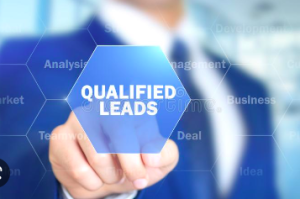Qualified Lead
Qualified Leads
Definition
Qualified leads are potential customers who have shown a high level of interest in a product or service and have the potential to become paying customers.
Description
These are potential customers who have already shown interest in a product or service and have been identified as having a higher likelihood of becoming paying customers.

These leads have typically engaged with a company in some way, such as filling out a contact form or subscribing to a newsletter, and have provided enough information to be evaluated and segmented by the company’s sales and marketing teams. These are considered more valuable than unqualified leads, as they represent a higher likelihood of conversion and are more likely to be receptive to targeted messaging and sales outreach.
Importance of Qualified Leads
Qualified leads are essential for several reasons:
- Higher conversion rates: These are more likely to become paying customers, as they have shown genuine interest in a product or service and are further along in the buying process. This translates to higher conversion rates and increased revenue for businesses.
- Cost-effective: These are more cost-effective to target and convert than unqualified leads, as they represent a higher likelihood of conversion and require less time and resources.
- Improved targeting: By identifying and targeting qualified leads, businesses can focus their efforts on the most promising prospects and tailor their messaging and outreach to their specific needs and interests.
- Better customer insights: These leads provide valuable insights into customer behaviour and preferences, which can inform product development, marketing strategies, and customer retention efforts.
How to generate Qualified Leads?
There are several ways to generate them:
- Content marketing: Creating high-quality, educational content that addresses your target audience’s pain points and interests can attract qualified leads and position your business as a thought leader in your industry.
- Search engine optimization (SEO): Optimising your website and content for search engines can help potential customers find your business when searching for relevant keywords and phrases.
- Social media marketing: Leveraging social media platforms to engage with your target audience and promote your content can help generate interest and drive leads to your website.
- Email marketing: Sending targeted email campaigns to subscribers who have opted in to receive communications from your business can help nurture leads and move them closer to conversion.
- Referral marketing: Encouraging satisfied customers to refer their friends and colleagues to your business can effectively generate them.
- Paid advertising: Running targeted paid advertising campaigns on search engines and social media platforms can help reach a larger audience and drive more such leads to your website.
- Events and webinars: Hosting events and webinars that provide value to your target audience can help generate these leads and position your business as a thought leader in your industry.
Future of Generating Qualified Leads
The future of these are likely to be shaped by advancements in technology and changes in consumer behaviour. Here are some potential future trends:
- Increased personalisation: As consumers become more accustomed to personalised experiences, businesses must tailor their messaging and outreach to individual needs and preferences to generate them.
- Use of AI and machine learning: Advancements in AI and machine learning will allow businesses to analyse customer data more effectively and generate more accurate predictions about customer behaviour, which can help generate more qualified leads.
- Greater emphasis on customer experience: Businesses prioritising the customer experience are more likely to generate qualified leads, as satisfied customers are more likely to refer friends and colleagues and become repeat customers.
- Integration with chatbots and voice assistants: Chatbots and voice assistants can engage with potential customers and generate qualified leads by providing instant responses to queries and guiding prospects through the buying process.
- Increased focus on ethical data collection and privacy: As concerns around data privacy continue to grow, businesses must ensure that they are collecting and using customer data ethically and transparently to generate qualified leads.
Example
Tata Motors is a leading automotive manufacturer in India. Tata Motors generates qualified leads through a variety of channels like online lead generation forms. Tata Motors’ website includes a dedicated section for customers to fill out online forms to request information on their vehicles, book test drives, and schedule service appointments.
 The brand engages with customers on social media platforms such as Facebook and Twitter, where they post updates about new models, promotions, and customer testimonials.
The brand engages with customers on social media platforms such as Facebook and Twitter, where they post updates about new models, promotions, and customer testimonials.
Tata Motors hosts events and webinars to showcase its latest models and provide education on automotive topics, which can help generate qualified leads. The company encourages satisfied customers to refer their friends and family to their dealership through referral programs, which can help generate qualified leads.
FAQ
What are qualified leads?
These are potential customers who have shown a genuine interest in a company’s products or services and have been vetted by the company’s marketing or sales team as having a higher likelihood of converting into paying customers.
How do I generate qualified leads?
To generate these leads, businesses can use a variety of tactics such as content marketing, email marketing, social media marketing, SEO, PPC advertising, and events. It’s important to tailor these tactics to the specific needs and preferences of the target audience to increase the likelihood of generating qualified leads.
Why are qualified leads important?
These leads are important because they represent potential customers who have already shown interest in a company’s products or services. This means they are more likely to convert into paying customers, which can increase revenue and profitability for the business.
What is the difference between a lead and a qualified lead?
A lead is a potential customer who has expressed interest in a company’s products or services. In contrast, a qualified lead is a lead that has been vetted by the company’s marketing or sales team and deemed more likely to convert into a paying customer.
How can I measure the effectiveness of my qualified lead-generation efforts?
Businesses can use various metrics to measure the effectiveness of their qualified lead generation efforts, including conversion rates, lead quality scores, and customer lifetime value. Tracking these metrics over time and adjusting marketing and sales strategies as needed to optimise results is essential.
How can I nurture my qualified leads?
To nurture qualified leads, businesses can use personalised email marketing, retargeting ads, and personalised content to keep potential customers engaged and move them further along the sales funnel. It’s important to tailor these tactics to the specific needs and preferences of the target audience to increase the likelihood of conversion.
What is the future of qualified leads?
The future of qualified leads is likely to be shaped by advancements in technology and changes in consumer behaviour. This may include greater personalisation, use of AI and machine learning, greater emphasis on customer experience, integration with chatbots and voice assistants, and increased focus on ethical data collection and privacy.





We would love to have your opinion.